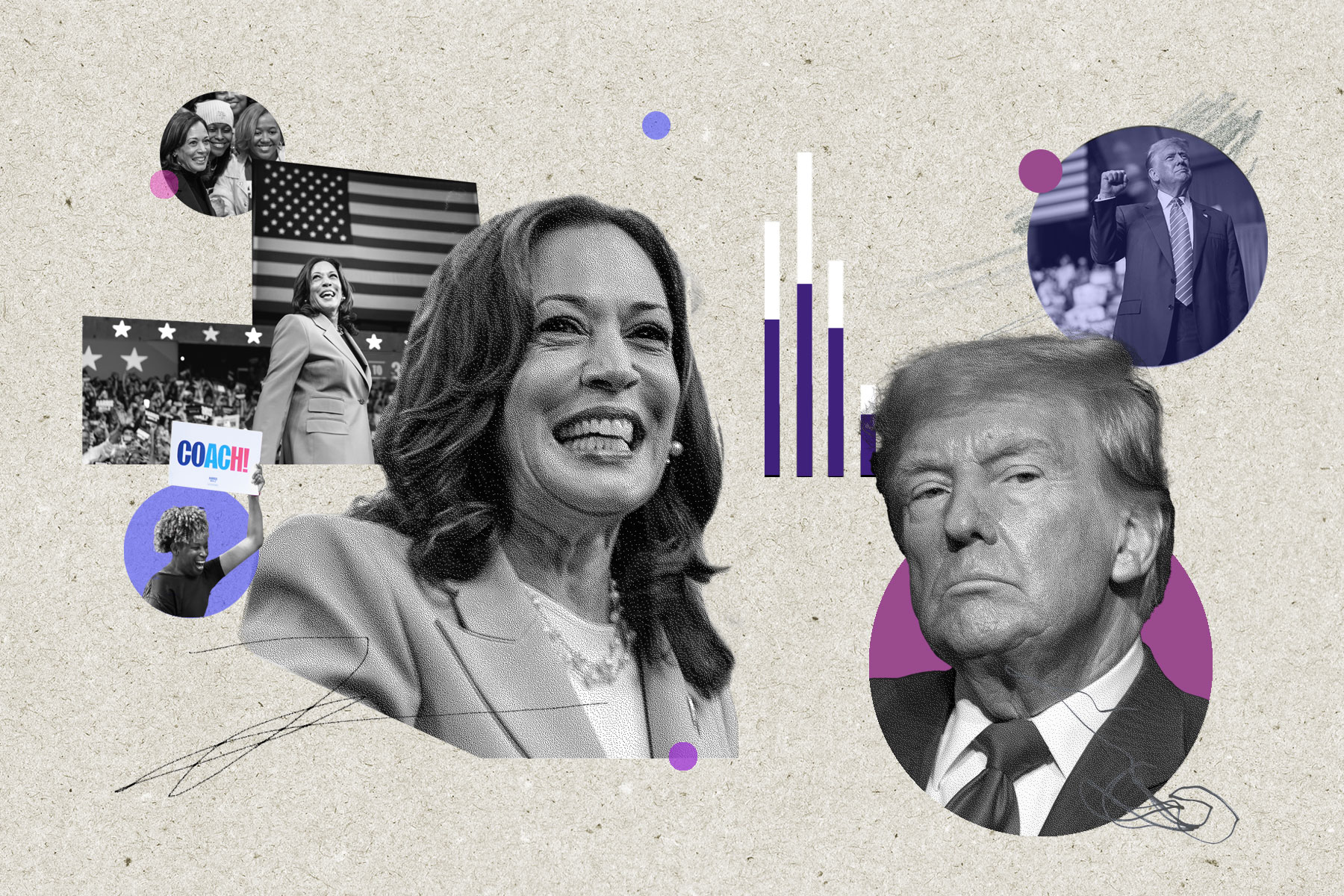Your trusted source for contextualizing America’s core issues. Sign up for our daily newsletter to read future poll stories first, or donate today to support more projects like this.
Vice President Kamala Harris holds a three-point lead over former President Donald Trump, boosted by a wider advantage with women voters than he holds with men, according to a new 19th News/SurveyMonkey poll.
Ahead of their first and so far only scheduled presidential debate, the poll reveals that 44 percent of registered voters back Harris, the Democratic nominee, and 41 percent say they back Trump, the Republican. Meanwhile, 10 percent say they are undecided.
Harris currently leads among women voters by 13 points (48 percent to 35 percent) and Trump leads men by eight points (47 percent to 39 percent). Nonbinary voters support Harris by a margin of 76 points (83 percent to 7 percent).
Half of voters approve of Harris, putting her net positive favorability rating within the poll’s margin of error. Among women registered voters, she holds a 12-point net positive favorability rating; among men, she is 10 points underwater. Harris holds a 72-point net positive favorability rating among nonbinary voters.
Harris has been a candidate since President Joe Biden dropped out on July 21, making hers the shortest general election campaign in modern history. With just eight weeks until Election Day, Harris and Trump are taking different approaches to make their case to voters. She has largely spurned major media interviews in favor of speeches and campaign events focused on rolling out specific policies. He has conducted more interviews and news conferences but maintained a comparatively lighter campaign schedule, relying on his running mate, Sen. JD Vance, for much of the retail politicking.
The poll also reveals that Democrats lead on the generic ballot for the U.S. House by three points, 42 to 39 percent, among registered voters. Women prefer the Democrat running for the House seat in their district by a 14-point margin, while the Republican contender has a seven-point edge with men. Nonbinary voters would vote for the Democrat by a margin of 72 points, 80 to 8 percent.
SurveyMonkey conducted this poll online from August 26 through September 4 among a national sample of 20,762 adults, including 18,123 registered voters, with a modeled error estimate of plus or minus 1.0 percentage points.
One of the poll’s key takeaways is that women favor Harris more than men across every racial and ethnic subgroup. If elected, Harris, who is Black and Indian American, would be the first woman president of the United States.
Trump enjoys his highest support among White men, whom he leads by 14 points; White women back Harris by six points. Black women support Harris by a margin of 59 points, while Black men support her by 30 points.
Latinx and Asian American-Pacific Islander (AAPI) voters make up sizable portions of the electorate in critical battleground states, including Arizona and Nevada. Harris leads among Latinas by a margin of 16 points, while Latinos back Trump by seven points. AAPI women support Harris by 11 points. Trump, for his part, leads AAPI men by just two points.
When broken down by age, the poll shows that Harris holds higher support than Trump among older and younger voters. She is backed by 53 percent of those who are 65 and older; 39 percent of them support Trump. Trump has a narrow lead among 35- to 64-year-old voters, while Harris has an edge among voters 18 to 34.
Independent voters who don’t lean toward either major political party are still largely up for grabs, the poll shows. Thirty-seven percent of them are undecided, 23 percent support Trump, 20 percent support Harris and 19 percent favor another candidate.
-
Explore Our Findings:
-
Explore Our Findings: The State of Our Nation: Polling Americans’ priorities for Election 2024
Nearly half of independent voters, or those who aren’t registered to a political party, named inflation or the cost of living as their top voting issue.
Inflation is a leading concern going into the election, with 38 percent of all registered voters and 39 percent of women naming it the issue that matters most to them. After inflation, men were most likely to name immigration (12 percent) or jobs, unemployment and wages (10 percent) as their top issues. Women were more likely to name health care or abortion (11 percent each).
While Harris hasn’t explicitly centered the historic nature of her candidacy in her campaign, it still mobilizes her supporters — especially those represented in her Black and South Asian heritage. The poll reveals that enthusiasm to vote for her rose by five points among Black women and five points among AAPI women when they were asked how excited they were to vote for a candidate who could become the first woman president.
Overall, Harris also holds a slight edge in voter enthusiasm over Trump — 92 percent of Harris supporters say they are very or somewhat excited to vote for her, while 87 percent of Trump’s supporters say the same.
The marriage gap has increasingly come to define American politics in the past several decades as married Americans have moved toward the Republican Party while voters who have never been married, especially women voters, have swerved left. Trump’s running mate selection of Vance, who has repeatedly singled out women without children in his rhetoric, illuminates this growing divide.
Married men back Trump by 12 points, 51 percent to 39 percent, while men who have never been married back Harris by three points, 41 to 38 percent, the poll finds.
Meanwhile, married women, who have leaned Republican in other data, narrowly back Harris, 46 to 41 percent. Women who have never been married support her by a much larger margin of 29 points, 52 to 23 percent.
Republicans, including Trump, have increasingly targeted LGBTQ+ people with legislation and incendiary rhetoric leading up to the 2024 election. Sixty-seven percent of LGBTQ+ voters support Harris.
Parents, as a group, support Trump over Harris by 13 points, 47 to 34 percent. Trump has a large advantage among fathers, who back him by 26 points, 55 to 29 percent, while the candidates are statistically tied among mothers. Parents of children under 2 supported Trump by the largest margin, 49 to 28 percent.
Both the Harris and Trump campaigns are centering family policy in their messaging, but coming at it from different approaches. Both have rolled out policies aimed at courting parents, including permanently expanding the child tax credit.
When asked about the four candidates seeking the White House, 42 percent of poll respondents said Harris cares about the problems facing people like them and 40 percent said the same of Trump. The difference was larger between the Democratic vice presidential nominee and Vance: 35 percent of voters said Walz cared about their problems while 26 percent said so about Vance.
To check your voter registration status or to get more information about registering to vote, text 19thnews to 26797.







